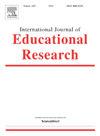Flipped Classroom or flip to foster self-regulation competencies in Mathematics in Economics and Business students
IF 2.5
3区 教育学
Q1 EDUCATION & EDUCATIONAL RESEARCH
引用次数: 0
Abstract
This study evaluates the implementation of the Flipped Classroom (or Inverted Classroom) methodology in university-level Mathematics courses for Economics and Business Administration students, addressing common challenges such as quantitative deficiencies, diverse student backgrounds, variability in learning paces, and math anxiety, which often lead to demotivation and disengagement.
The quasi-experimental design included three student groups, with a total sample of 137 students: an experimental group using the Flipped Classroom method, and two control groups taught through traditional methods. Data were collected via pretests, posttests, and a satisfaction survey.
The results reveal that students who actively engaged with the Flipped Classroom methodology showed significant improvements in academic performance, particularly among those with weaker mathematical backgrounds, compared to the ones who followed traditional methods. The analysis demonstrates that this improvement is independent of instructor quality, as the Flipped Classroom methodology fosters the development of self-regulation and self-efficacy skills. These competencies were key in enhancing students' academic success, rather than the specific instructional approach.
Additionally, students reported high levels of satisfaction with the Flipped Classroom approach, citing increased time investment, greater engagement with Mathematics, and recommending its broader application in other subjects. Overall, the study supports the effectiveness of the Flipped Classroom methodology in improving academic outcomes and fostering essential learning skills.
翻转课堂或翻转,以培养自我调节能力的数学经济学和商业学生
本研究评估了翻转课堂(或倒置课堂)方法在经济学和工商管理专业大学水平数学课程中的实施情况,解决了诸如数量不足、学生背景多样化、学习速度变化和数学焦虑等常见挑战,这些挑战通常会导致学生失去动力和不投入。准实验设计包括三个学生组,共137名学生:实验组采用翻转课堂教学方法,对照组采用传统教学方法。数据通过前测、后测和满意度调查收集。结果显示,与采用传统方法的学生相比,积极采用翻转课堂方法的学生在学习成绩上有显著提高,尤其是那些数学背景较弱的学生。分析表明,这种改善与教师素质无关,因为翻转课堂方法促进了自我调节和自我效能技能的发展。这些能力是提高学生学业成功的关键,而不是具体的教学方法。此外,学生们对翻转课堂教学方法的满意度很高,他们认为翻转课堂增加了时间投入,提高了对数学的参与度,并推荐将其更广泛地应用于其他学科。总体而言,该研究支持了翻转课堂方法在提高学术成果和培养基本学习技能方面的有效性。
本文章由计算机程序翻译,如有差异,请以英文原文为准。
求助全文
约1分钟内获得全文
求助全文
来源期刊

International Journal of Educational Research
EDUCATION & EDUCATIONAL RESEARCH-
CiteScore
6.20
自引率
3.10%
发文量
141
审稿时长
21 days
期刊介绍:
The International Journal of Educational Research publishes regular papers and special issues on specific topics of interest to international audiences of educational researchers. Examples of recent Special Issues published in the journal illustrate the breadth of topics that have be included in the journal: Students Perspectives on Learning Environments, Social, Motivational and Emotional Aspects of Learning Disabilities, Epistemological Beliefs and Domain, Analyzing Mathematics Classroom Cultures and Practices, and Music Education: A site for collaborative creativity.
 求助内容:
求助内容: 应助结果提醒方式:
应助结果提醒方式:


